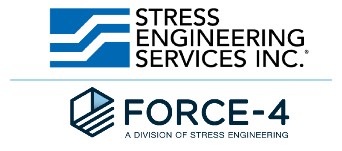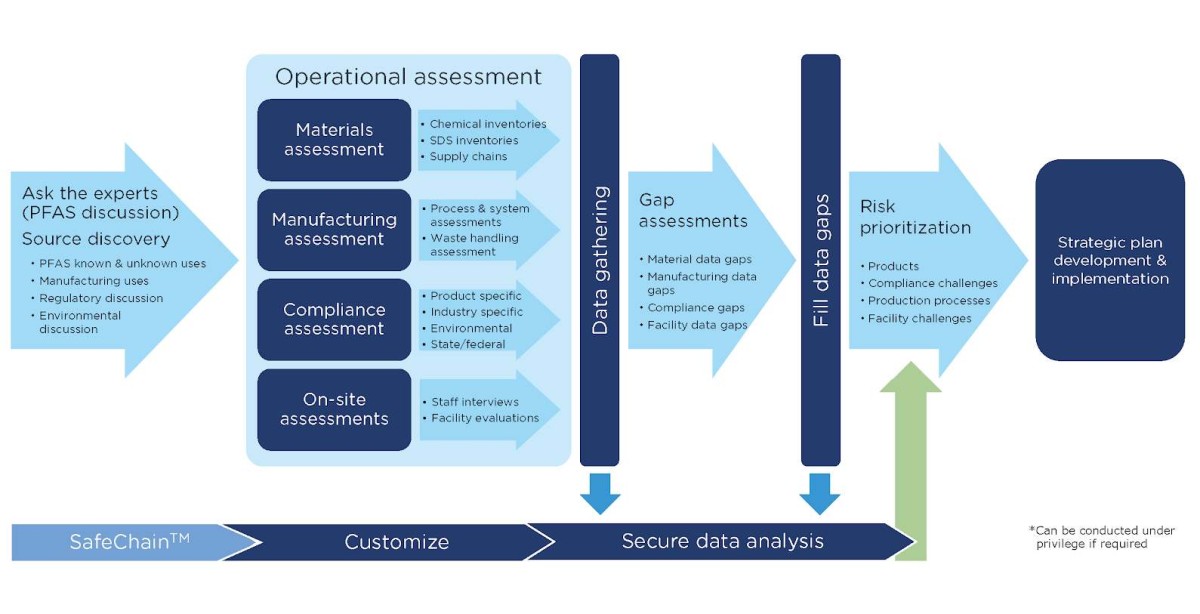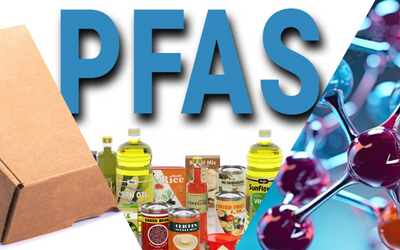
We provide structured and secure PFAS operational assessments that inform the development of management strategies to assess these potential risks and liabilities.
Because of the extremely confidential nature1 of the information associated with these operational assessments, the Ramboll/SES/AWS team is building SafeChain™, a secure PFAS data management solution built on Amazon Managed Blockchain infrastructure and managed by Stress Engineering Services.
SafeChain™ is necessary for two reasons:
- Secure the proprietary information of the manufacturer (client) in a way that ensures data integrity.
- To assure suppliers to the manufacturer that their data will be held securely and accessible only by an independent 3rd party.

Globally regulations are quickly evolving to include proposed or enacted bans on the use of per- and polyfluoroalkyl substances (PFAS) in commerce or products. Similarly, state and federal regulations are increasing to respond to and prevent PFAS contamination in the environment.
The risks and liabilities associated with PFAS and the changing regulatory landscape may include substantial financial costs, disputes or litigation, regulatory compliance and enforcement costs, as well as significant reputational risks, business interruption, and capital expenditures.
Notably in September 2023, the US Environmental Protection Agency (EPA) set a timetable for US manufacturers or importers of manufactured goods to begin reporting on PFAS content in their products.
With few exemptions, manufacturers must begin reporting current and historical results regarding the presence of PFAS in their supply chains between November 2024 and May 2025.
US TSCA PFAS reporting rule is effective now! Are you ready? – Ramboll Group
Can we help you?
Clint Haynes
Responsible for SES’s medical, consumer and pharmaceutical drug delivery services practices as well as Force-4, SES’s product development group and Stress Technology Solutions, a SaaS commercialization practice.
Lisa Navarro
A regulatory toxicologist specializing in compliance and regulatory support for consumer products, bridging commercial and scientific needs.
Eric Wood
Ramboll’s Global Director of PFAS and Emerging Contaminants, with over 40 years’ experience in environmental science and hydrology.
PFAS operational assessments
The PFAS operational assessment process focuses on identifying potential risks and liabilities arising from the current or historical presence, use and/or environmental release of PFAS associated with products and facilities.
With as many as 12,000 or more compounds (Standards Address PFAS in Everyday Products | ASTM Standardization News) considered as PFAS, these substances can enter a manufacturer’s supply chain through both known and unknown pathways in raw materials, components, manufacturing equipment, surface treatments and services maintenance contracts, to name a few.
Similarly, these substances can enter the environment through many potential pathways as part of manufacturing processes, waste streams, and product use.
The assessment process is designed to extract information from all these pathways and create a structured view and record of the findings.
PFAS operational assessments are a series of parallel workstreams designed to extract data regarding PFAS that can make its way into a product and the environment, both intentionally and unintentionally.
1. Materials assessments
SDS and chemical inventories
Most corporations maintain records in the form of safety data sheets (SDS) and chemical inventories to memorialize the chemical composition of their products and materials used in their manufacturing operations.
At present, because of the diverse definitions of PFAS, most suppliers don’t know whether or not a compound or constituents in a material they use in the manufacturing process is subject to PFAS regulations.
For this reason, Ramboll has developed an automated, software-based tool that analyzes data from SDS and chemical inventory documentation and identifies suspect chemistry. This tool enables Ramboll to rapidly scan thousands of client and supplier SDS data via an automated process that can identify PFAS.
Supply chain & other inventory resources
PFAS can make their way into a product along a multitude of pathways from anywhere in a supply chain. These situations require a deep dive into the supply chain and the chemistry of products used by the suppliers themselves.
To that end, the Ramboll/SES team can work with suppliers, as a confidential interface, to help them uncover information necessary, upstream of their commercial relationship with our client, to characterize the constituents of the products they supply.
SafeChain™ is critical to the successful completion of this workstream. In most cases, it is unlikely that a supplier will be comfortable providing this information to their customer.
SafeChain™ is structured such that it maintains permissioned, confidential access to the blockchain on behalf of the client and for the security of the supplier.
The client has no direct access to the data, thus providing the “firewall” needed between supplier and customer data.
2. Manufacturing assessments
PFAS contact can occur indirectly, outside of product chemistry or formulation.
Common substances used as manufacturing aids such as line lube on filling lines, mold release in injection molding, grease/lubricants, or o-rings in process vessels, to name a few, can introduce PFAS.
A technical team of engineers and chemists from the Ramboll/SES team can visit client facilities and ‘walkdown’ the manufacturing operations with client manufacturing staff to identify potential sources of PFAS introduction.
The process of investigation is similar to that described above with all data and results being secured in the SafeChain™ blockchain architecture.
3. Compliance assessments
PFAS compliance requirements are evolving at a rapid pace at state and federal levels in the US as well as differing regulations in global markets.
This workstream begins by assessing a manufacturer’s compliance risks and liabilities based on the local and global markets they serve.
Regulations considered may be related to product, industry, or environmental compliance.
4. On-site assessments
Conducting visits to facilities to gain an understanding of physical and environmental settings, current and historical operations conducted at the facility, nearby properties that may serve as sources of PFAS, and nearby potential sensitive receptors can inform a prioritization of potentially recommended follow-on actions.
The number of facilities to include will be determined in consultation with the client, but the Ramboll/SES team frequently makes recommendations as requested.
Results of each workstream are reviewed in totality as output from one may be used to inform another.
Post completion of the initial operational assessment, we offer monitoring services to enable manufacturers/product owners to maintain a current PFAS risk assessment for individual products or complete product portfolios. We also offer additional tools that can be used for this purpose.
SafeChain™ for secure PFAS data management
The backbone of the OAP process is SafeChain™, which offers a secure data management solution that is traceable and transparent. SafeChain™ is designed for product manufacturers that need to document the chemical composition of materials used in their products and that their products are exposed to during manufacturing. Amazon Managed Blockchain underpins SafeChain™ and provides a secure and unalterable record that can be used to satisfy current and future regulatory requirements.
The key features of SafeChain™ include:
- Immutable ledger: Once data are entered into SafeChain™, they cannot be altered or tampered with, ensuring the integrity and reliability of the sourcing records.
- Private blockchain: SafeChain™ operates on the AWS private blockchain, which means it is accessible only to authorized users, offering enhanced security and privacy.
- Traceability and transparency: By tracking every material from its source to the final product, intermediary processes, and to waste streams, SafeChain™ offers unparalleled traceability.
Compliance and reporting: The platform aids in compliance with various regulatory standards, providing detailed reports on the material composition, which is essential for quality control and safety certifications.
The pulse of PFAS regulatory exposure
The PFAS operational assessment process is designed to provide corporate leadership and risk management professionals with secure data acquisition, management and reporting capabilities, and risk prioritization and strategic implementation plan development to enable companies to meet the requirements of expanding PFAS regulatory requirements.
When indicated by an operational assessment, we have extensive experience helping clients with:
- Environmental reviews
- Product safety and stewardship
- Toxicology, exposure assessment, and epidemiology
- Water and wastewater treatment
- Litigation support, expert services, and negotiated settlements
- Property transactions and due diligence
- Air quality and pollution control
- Risk communication
- Customer requirements
- Supply chain considerations
- Ingredient alternative assessments
- Product engineering redesign
- Process engineering and re-engineering
- Operational improvements
- Site investigation and remediation
- Ecological services
- Implementation of BMP (best management practices)
- Building modifications




